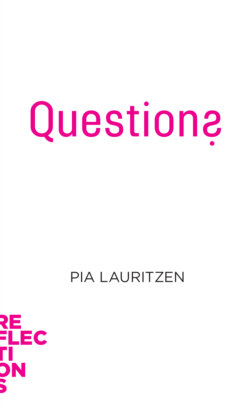Читать книгу Questions - Pia Lauritzen - Страница 8
На сайте Литреса книга снята с продажи.
THE PARADOX OF THE QUESTION
ОглавлениеPlato and Heidegger represent two different currents in understanding and using questions within Western philosophy and the history of ideas. Without asking themselves the actual question, philosophers have provided two main answers to why anyone rarely calls questions into question. First, it is because we cannot do so: It’s ‘always already’ too late to avoid asking. Second, it is because we should not do so: There’s ‘always already’ something else more important to ask about.
Both of these answers presuppose, however, that the question of the question dissolves within the question of the human being’s essential way of being and developing. It is precisely the dissipation of this questioning the question, and the fact that it’s the question that dissolves itself, that set the scene for the French philosopher Jacques Derrida.
Unlike Plato, Heidegger, Gadamer and others who dealt with questions more or less directly, Derrida actually asks why we do not call questions into question. He also provides an answer – indeed, one that differs from Plato’s and Heidegger’s by being grounded not in history, but in the question itself.
According to Derrida, the reason neither philosophers nor scientists nor anyone else calls questions into question is that even though it sets something out in the open, a question always keeps something else hidden.
Now this is where things get technical. Not in the sense ‘difficult to understand’, but in the sense ‘technological’. You see, there is a technology associated with asking questions.
The technology of the question lies in the fact that it forces the issue at hand to reveal itself in a certain manner. For example, when we ask what a horse is, we presuppose that a horse is a something that can be understood and described. If we instead ask how a horse differs from a human being, we presuppose the something that a horse is must be understood in relation to a something else.
Whereas, in the first case, the horse reveals itself as something-in-itself – that is, as an absolute entity – in the second case, it is related to something else and thus reveals itself as a relative entity. In other words, the horse appears not only differently, but essentially differently, depending on how we ask about it. Put differently: The questions we ask, and don’t ask, define our understanding of and relationships with our surroundings.
So what is concealed when we ask a question, and hence not called into question? The question’s presuppositions. When we ask as we do, we are not aware that ‘something’ will reveal itself in a certain manner, so we are equally unaware that we could be asking differently – and that ‘something’ could thereby reveal itself differently. In short, we are not aware of what the question does.
Posing a question means positioning oneself in a certain way in relation to the object of the query. One poses; posits; takes a position. With this positioning, one is always in the process of answering. This is why I was able to deduce earlier – in the case of the question, “May I ask you something?” – that it forecloses the issue at hand before managing to raise it.
This is the paradox of the question: Even as it opens up new ways of seeing and understanding the world, it simultaneously establishes a framework for, and thereby a limit to, understanding. If different people and cultures turn out to have different ways of relating to and using questions, then the line between what is comprehensible and what is incomprehensible will necessarily be drawn in different places, and the seeds of misunderstanding will have been sown.
Questions are just as revealing as dreams, or even more so, the German-American phenomenologist Erwin W. Straus once remarked. But if, in asking, we are always answering, then what we are revealing is always ourselves. Does this mean we cannot, should not, or must not call questions into question?
No, it means the question is the key to understanding why we think and act as we do. Questioning is not a human characteristic that always is in the same way, and so cannot be otherwise. Rather, the question is what reveals – precisely because it could be otherwise – how we perceive ourselves and our surroundings. In other words, questioning is not just what distinguishes us from animals and gods, but also what distinguishes each of us from others.
There are many ways to ask questions, and thereby to think and be. The question is: What does it reveal about Western thought and civilisation that we relate to and use questions as we do? What does it mean for our relationship with ourselves and our surroundings that we have historically understood the question of the question in the light of the question of Man? And what opportunities do we have for investigating whether there are other options?
